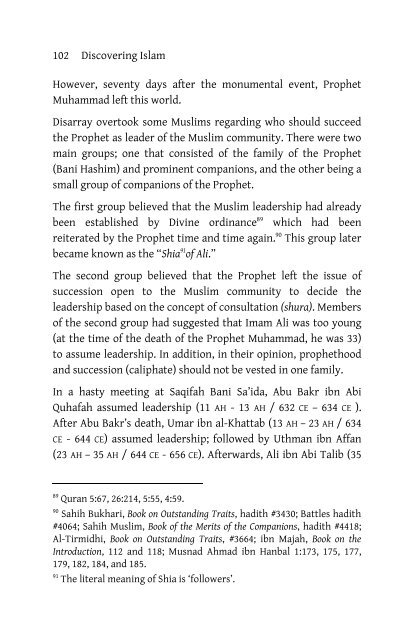Discovering Islam
Discovering Islam is an invitation to learn about the fundamental message, spirit, and practice of Islam. This book covers an array of essential concepts, practices, and beliefs. It takes you through the core principle of the Oneness of God to the most contemporary concept of (jihad).
Discovering Islam is an invitation to learn about the fundamental
message, spirit, and practice of Islam. This book covers an array
of essential concepts, practices, and beliefs. It takes you through
the core principle of the Oneness of God to the most
contemporary concept of (jihad).
You also want an ePaper? Increase the reach of your titles
YUMPU automatically turns print PDFs into web optimized ePapers that Google loves.
102 <strong>Discovering</strong> <strong>Islam</strong><br />
However, seventy days after the monumental event, Prophet<br />
Muhammad left this world.<br />
Disarray overtook some Muslims regarding who should succeed<br />
the Prophet as leader of the Muslim community. There were two<br />
main groups; one that consisted of the family of the Prophet<br />
(Bani Hashim) and prominent companions, and the other being a<br />
small group of companions of the Prophet.<br />
The first group believed that the Muslim leadership had already<br />
been established by Divine ordinance 89 which had been<br />
reiterated by the Prophet time and time again. 90 This group later<br />
became known as the “Shia 91 of Ali.”<br />
The second group believed that the Prophet left the issue of<br />
succession open to the Muslim community to decide the<br />
leadership based on the concept of consultation (shura). Members<br />
of the second group had suggested that Imam Ali was too young<br />
(at the time of the death of the Prophet Muhammad, he was 33)<br />
to assume leadership. In addition, in their opinion, prophethood<br />
and succession (caliphate) should not be vested in one family.<br />
In a hasty meeting at Saqifah Bani Sa’ida, Abu Bakr ibn Abi<br />
Quhafah assumed leadership (11 AH - 13 AH / 632 CE – 634 CE ).<br />
After Abu Bakr’s death, Umar ibn al-Khattab (13 AH – 23 AH / 634<br />
CE - 644 CE) assumed leadership; followed by Uthman ibn Affan<br />
(23 AH – 35 AH / 644 CE - 656 CE). Afterwards, Ali ibn Abi Talib (35<br />
89<br />
Quran 5:67, 26:214, 5:55, 4:59.<br />
90<br />
Sahih Bukhari, Book on Outstanding Traits, hadith #3430; Battles hadith<br />
#4064; Sahih Muslim, Book of the Merits of the Companions, hadith #4418;<br />
Al-Tirmidhi, Book on Outstanding Traits, #3664; ibn Majah, Book on the<br />
Introduction, 112 and 118; Musnad Ahmad ibn Hanbal 1:173, 175, 177,<br />
179, 182, 184, and 185.<br />
91<br />
The literal meaning of Shia is ‘followers’.



